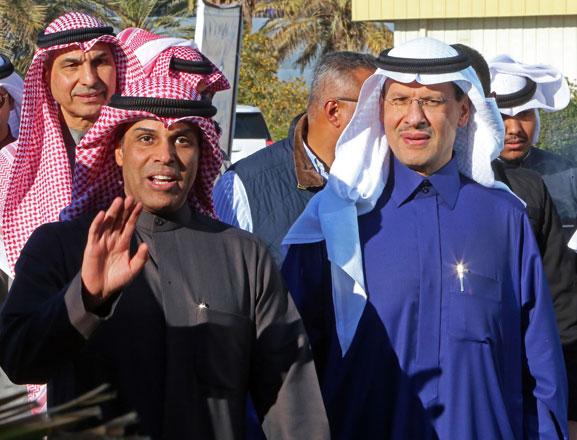You are here
Saudi Arabia, Kuwait ink deal to resume joint oil output
By AFP - Dec 24,2019 - Last updated at Dec 24,2019

Kuwaiti Oil Minister Khaled Al Fadhel (centre-left) and Saudi Oil Minister Prince Abdulaziz Bin Salman (Centre-right) arrive for a ceremony marking the signing of an agreement to reproduce oil in the neutral zone between the two countries, at Wafra about 100 kilometres south of Kuwait City, on Tuesday (AFP photo)
KUWAIT CITY — Saudi Arabia and Kuwait signed an agreement on Tuesday to resume pumping at two major oilfields in a shared neutral zone shut for five years due to a bilateral disagreement, officials said.
Kuwait’s oil minister Khaled Al Fadhel said on Twitter that the memorandum of understanding signed with Saudi Arabia included “the resumption of production in the divided zone”.
The state-run KUNA news agency reported that the two countries also signed an agreement on the demarcation of land and maritime borders in the neutral zone.
KUNA did not give details on the contents of the deal which likely revolves around amending previous border agreements between the two Arab nations.
The two fields were pumping some 500,000 barrels per day before production was halted, first at Khafji in October 2014 and then at Wafra seven months later, over a dispute between the neighbours.
Riyadh said at the time that the decision was due to environmental issues.
The oil produced in the neutral zone in the border area is shared equally between the two nations.
Khafji, an offshore field, was jointly operated by Kuwait Gulf Oil Co. and Saudi Aramco Gulf Operations, while the onshore Wafra field was operated by KGOC and Saudi Arabian Chevron.
Kuwait had blamed Saudi Arabia for unilaterally halting output at Khafji, noting it was entitled to five years’ notice under a joint agreement signed in 1965.
The two countries have been negotiating to resolve the row and resume production since June 2015.
The talks involved Kuwait’s Emir Sheikh Sabah Al Ahmad Al-Sabah visiting Riyadh and Saudi Crown Prince Mohammed Bin Salman visiting Kuwait City.
Tuesday’s agreement comes as oil prices are under pressure due to abundant reserves and weak global economic growth.
Continued soft pricing has prompted the Organisation Producing Exporting Countries (OPEC) and its allies to make deeper production cuts starting next month.
OPEC kingpin Saudi Arabia pumps just under 10 million barrels per day, while Kuwait produces around 2.7 million bpd.
Related Articles
Saudi Arabia and Kuwait decided to shut the second oilfield in the neutral zone, effectively halting output in the area which produced 500,000 barrels of oil, an official said Monday.
KUWAIT CITY — Kuwait and Saudi Arabia are to suspend oil production from the neutral zone they share in June as part of cuts they agreed to
KUWAIT CITY — Saudi Arabia and Kuwait have begun talks to resolve a dispute that halted oil production in the neutral zone between the Gulf

Opinion
Apr 09, 2025
Apr 08, 2025
- Popular
- Rated
- Commented
Apr 08, 2025
Apr 09, 2025
Newsletter
Get top stories and blog posts emailed to you each day.
















